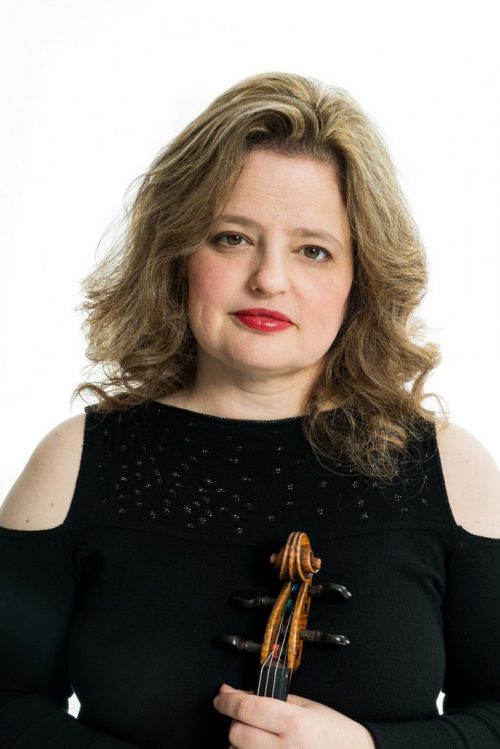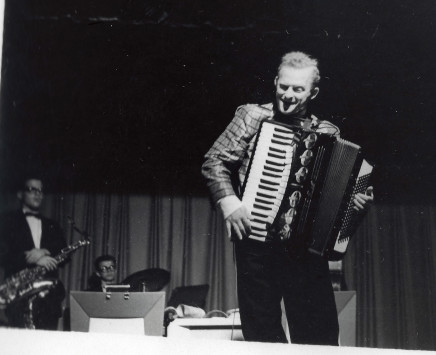When Wegman Family Professor of Violin Renée Jolles first came to Eastman as a faculty member in 2013, she was surprised to find a lack of Rochester-area concerts that observe Yom HaShoah (Holocaust Remembrance Day). She launched an annual Holocaust Remembrance Day concert in 2014 at the Eastman School of Music to pay tribute to her heritage and give back to the Rochester community. This year’s concert, “A Time to Remember…,” takes place on Sunday, April 16 in Kilbourn Hall at 7:30 p.m.

Renée Jolles, Wegman Family Professor of Violin
“I looked around and thought that this was a way that I could really fill a niche and represent my identity as the daughter of a Holocaust survivor,” she says.
Her family’s story, however, is grim.
During the Holocaust, Renée’s father, Jerome Jolles, was sent to a Romanian work camp where, at 14 years of age, he buried the bodies of the dead. Her grandfather was allowed to keep operating the family button factory but was conscripted to make buttons for soldier uniforms. All but their immediate family were sent to death camps in Poland.
Jerome Jolles survived, yet “he wasn’t allowed to go to school, and they had to form their own Jewish school and they said anytime he stepped into the street it was entirely possible that he was just rounded up and sent to a camp,” says Renée. “They were literally afraid to walk in the streets.”

Jerome Jolles, father of Professor Renée Jolles, performing on the accordion with his Jerome Jolles Orchestra in the Catskills.
By 1947, they were able to escape to Prague, and then Renée’s grandparents were able to find family sponsorship to the US, but only for two. Her father and uncle went, instead, to Paris, where Jerome Jolles worked as a cafe musician until he was accepted to Juilliard for composition around 1950. After Juilliard, he lived and worked in New York City as a piano teacher, choral conductor, and as an accordion player with bands that would perform at places like the Catskills.
He married Susan Jolles, Renée’s mother, who was a harpist with the Metropolitan Opera, a recipient of the Naumburg Chamber Music Award, and who continues to perform today. Susan and Renée even perform together as the Jolles Duo. Renée grew up in New York City and attended the Juilliard School for her undergraduate and master’s degrees.
Jerome Jolles died in 2014, but even while he was alive, he was tight-lipped about the past. “He would just say, ‘It doesn’t concern you. It’s over, you should just go ahead and live a good life.’ He was always like that,” Renée recalls. “He was very private about his past. And he was very optimistic. He was just always looking to the future, always believing that things would be better.”
Although the past was painful for her father, Renée doesn’t want to forget. She wants to remember.
“It’s not to memorialize the dead but more to illustrate the resiliency and their hope for the future and the role that art plays in helping us to cope with these situations and to survive and surpass these experiences,” she says. “Art lives forever.”
On this year’s concert, “A Time to Remember…,” she’ll perform a solo violin work she just premiered in January at the United Nations Holocaust Memorial Ceremony by composer Victoria Bond called Sorrows Springs are the Same. Bond, who was the first woman to receive a doctorate in conducting from Juilliard, will attend the Eastman performance to read the poetry that inspired the work.
The program also includes several composers who either died or barely survived the Holocaust. Marina Lomazov, a professor of piano at Eastman, will perform the Suite Dansante en Jazz by the German Jewish composer Erwin Schuloff, who died in the Wülzburg prison near Bavaria in 1942. Vocalist Elise Noyes ‘22E (MM) and pianist Rebecca Golub ‘17E will perform the work of Austrian Jewish composer Viktor Ullman, who perished at the Terezin Concentration Camp.
A faculty string quartet (Mikhail Kopelman and Yoojin Jang, violins; Joshua Newburger, viola; and Ahrim Kim, cello) performs a string quartet by Rosy Wertheim, a Dutch Jewish composer and pianist who managed to survive in hiding but died shortly after the Holocaust due to malnutrition and cancer.
Clarinet faculty member Michael Wayne performs for the first time on Eastman’s Holocaust Remembrance concert with the Sonata for Clarinet and Piano by Mieczysław Weinberg, a Polish Jewish composer who escaped to Russia, only to be persecuted there. In a twist of luck, Stalin died shortly after Weinberg was imprisoned and he was released. His career in Moscow was supported by Shostakovich, who championed Weinberg’s music.
“With anti-Semitism, bigotry and hatred on the rise, it is more important than ever to learn from lessons of the past,” says Renée. “By remembering the staggering loss of human potential and glimpsing the genius and humanity of those whose lives were tragically cut short, we can find the energy and willpower needed to combat hate today.”
-Written by Anna Reguero, Senior Writer and Editorial Manager
